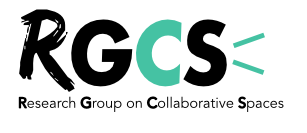
RGCS and its Milan Chapter, in partnership with COST Action CA18214, are launching the 5th RGCS Symposium as an online event where to share ideas on the latest disruptive evolution of collaborative practices, workspaces and communities in the wake of the Covid-19 crisis!
In their various manifestations, from coworking spaces to open communities, forms of commons-based peer production and collaboration networks, collaborative practices have become widespread in knowledge-intensive industries, most commonly across urban environments (e.g., Palvalin and Vuolle, 2016), and strongly depend on face-to-face interactions to unleash their full potential. The Covid-19 pandemic, however, has bluntly interrupted this virtuous cycle.
In the unprecedented period of health crisis experienced on a worldly scale in the first half of 2020, the ways in which collaboration happens changed abruptly. Contextually, the most extensive remote-work (WFH) experiment has occurred (Konya, 2020; Memoori, 2020), which offers several opportunities for investigating new forms of collaborative practices, workspaces and communities in the absence of face-to-face interaction. Arguably, collaborative and shared spaces are those which suffered the most from the Covid-19 downturn, first because of the shutdown, then - when reopened - since they were forced to radically redesign the practices of everyday interaction taking place within the space. Epistemic communities, experimental innovation, coworking spaces, corporate offices, and hubs are only some of the collaborative contexts where knowledge sharing is supposed to happen (Ciaramella, Rossi-Lamastra, Rovelli and Tagliaro, 2018). While collaborative spaces have experienced in recent years a multiplication of the objectives, subjects and structures involved, leading to a reinterpretation and progressive differentiation of the practices that take place within them (Ivaldi et al., 2019), today the many independent workers, freelancers to entrepreneurs, employees and founders of startups who inhabit them are called to reinvent them, to cope in the “new normal” of the pandemic society. As a consequence, new collaborative spaces’ arrangements and related innovative collaborative practices have emerged. These deserve attention to understand the extent to which they are only temporary or can become the “future spaces / ways of collaborating”.
The RGCS 2020 online symposium is focusing on the exploration, analysis and critique of those original collaborative practices that were born or evolved due to Covid-19. The symposium will discuss contributions that challenge the concept of face-to-face collaborative practices, and explore examples of collaboration that might expand our understanding of the relationship between physical and digital collaborative experiences.
We welcome not only scholars and practitioners, but whoever is interested in this ongoing evolution, to join our event on December 14th and 15th.
The participation for both presenters and auditors will be totally free of charge, but registration is mandatory by December 6 here.
For submissions and questions: rgcs.milan@gmail.com
The Local Organizing Committee
Chiara Tagliaro (Politecnico di Milano), AlessandroGandini (Università degli Studi di Milano), Silvia Ivaldi (Università di Bergamo), Ilaria Mariotti (Politecnico di Milano), Alessandra Migliore (Politecnico di Milano), Federica Rossi (Politecnico di Milano), Giuseppe Scaratti (Università Cattolica del Sacro Cuore)
References
Bandinelli, C. (2019) The production of subjectivity in neoliberal culture industries: the case of coworking spaces. International Journal of Cultural Studies, DOI: 136787791987844.
Ciaramella, A., Rossi-Lamastra, C., Rovelli, P., & Tagliaro, C. (2018). Who talks about collaborative spaces, how, and why. CERN IdeaSquare Journal of Experimental Innovation, 2(1), 3–7. https://doi.org/10.23726/cij.2018.758
Colpaert, A., Sutherland, S. & Elliott, L. (2014). Forget the Workplace... for Now, Jones Lang LaSalle (JLL) Corporate Research.
Gandini, A., & Cossu, A. (2019). The third wave of coworking: ‘Neo-corporate’ model versus ‘resilient’ practice. European Journal of Cultural Studies, DOI: 1367549419886060.
Ivaldi, S., & Scaratti, G. (2019). Coworking Hybrid Activities between plural objects and sharing thickness. TPM: Testing, Psychometrics, Methodology in Applied Psychology, 26(1).
Konya, K. (2020, March 21). SURVEY: How Coworking Spaces are Navigating COVID-19. Retrieved April 7, 2020, from https://www.coworker.com/mag/survey-how-coworking-spaces-are-navigating-covid-19.
Memoori. (2020, March 19). COVID-19, the Worlds Biggest Remote Working Experiment is Underway. Retrieved April 7, 2020, from https://memoori.com/covid-19-the-worlds-biggest-remote-working-experiment-is-underway/
Palvalin, M. & Vuolle, M. (2016). Methods for identifying and measuring the performance impacts of work environment changes, Journal of Corporate Real Estate, 18(3), 164- 179.
Partners of the 5th RGCS symposium
COST Action CA18214: The COST project 'The geography of New Working Spaces and the impact on the periphery' involves 90 research partners from 30 countries - from October 1, 2019 to September 30, 2023. The aims of the project are i) sharing the scientific outcomes on new working spaces such as Coworking (CS) and Maker Spaces (MS) (definitions, typologies and geographical distributions) ii) comparing the best practices and direct and indirect impacts with a particular focus on the periphery iii) sharing the policy tools across the countries.
European Union Website: https://www.cost.eu/actions/CA18214
Project Website: www.new-working-spaces.eu
FB page https://www.facebook.com/COSTActionCA18214NeW.Sp
Twitter https://twitter.com/newworkingspace
FB group (Italy-covid 19) https://www.facebook.com/groups/886380135100739

